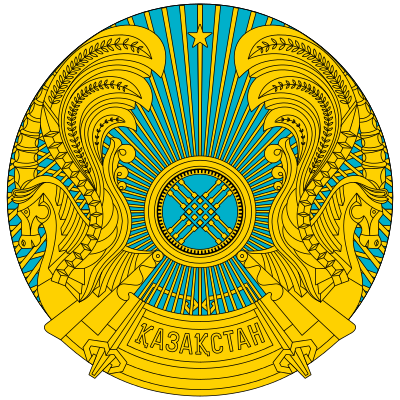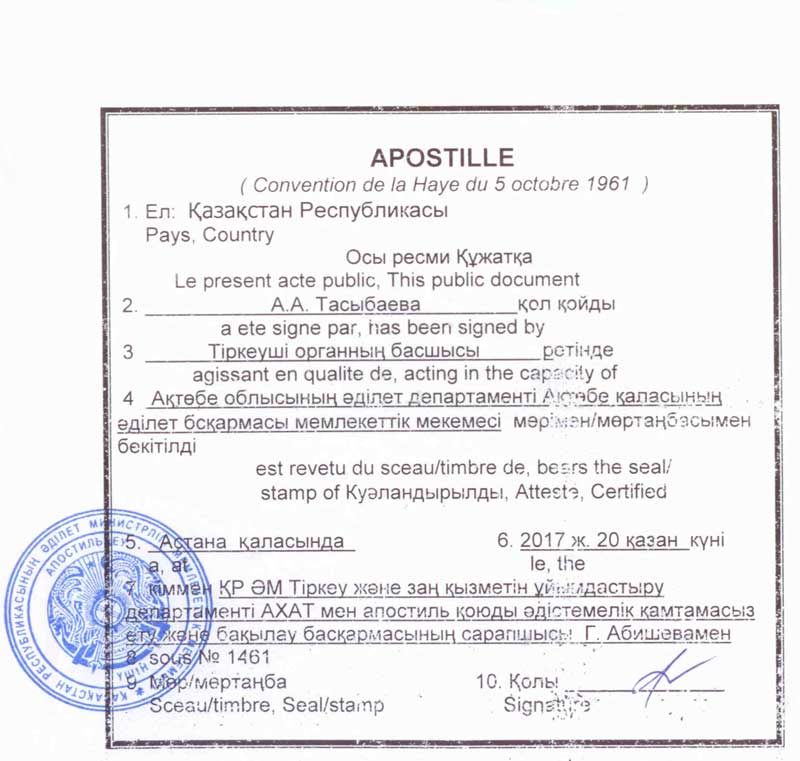
Schmidt & Schmidt offers legalization services for documents issued in Kazakhstan.
Referring to the Hague Convention of 1961, documents issued by government agencies of one member country of the Convention are valid in all Member States of the Convention and do not require any other form of certification, such as consular legalization, which considerably reduces the costs and time required for the certification of documents. Currently, more than 120 states have joined the Hague Convention.
Kazakhstan joined the Convention in 2001. Therefore documents issued in Kazakhstan and certified with Apostille are recognized in another member country without consular legalization.
The apostille is a confirmation of the authenticity of the signature and authority of an official document, as stipulated in the Hague Convention Abolishing the Requirement of Legalization for Foreign Public Documents of 5 October 1961.
Thus, no diplomatic authentication or consular legalization of documents from Kazakhstan is required for the legal communication with another member state of the Convention. The documents only need to be attested by an apostille certificate with an "apostille" stamp on it by the issuing state's authorities in order to be valid in the state of destination.
Apostille in Kazakhstan is a square stamp of at least 9x9 cm in the Kazakh language, containing the obligatory title "Apostille" and a reference to the 1961 Hague Convention in French (Convention de La Haye du 5 octobre 1961) written in French is a mandatory requirement for an apostille's validity.
Authorities responsible for issuing the apostille in Kazakhstan

- Ministry of Justice of the Republic of Kazakhstan
- Ministry of Education and Science of the Republic of Kazakhstan
- Ministry of Internal Affairs of the Republic of Kazakhstan
- Committee of Information and Archives of the Ministry of Culture, Information and Sports of the Republic of Kazakhstan
- Committee on Judicial Administration under the Supreme Court of the Republic of Kazakhstan (by agreement)
- Ministry of Finance of the Republic of Kazakhstan
- Office of the Prosecutor General of the Republic of Kazakhstan
- Ministry of Defense of the Republic of Kazakhstan
- Committee on National Security of the Republic of Kazakhstan
The process of apostille legalization in Kazakhstan foresees that the Competent Authority checks and certifies the authenticity of the signature on the underlying public document and the identity of the seal or stamp which the document bears (if any). Afterward, a certificate with a stamp "apostille" is attached to the document. As a rule, the apostille is placed on the reverse side of the original document or a separate sheet and gets affixed to it.
Which documents can be apostilled
| Can be certified with an apostille | Cannot be certified with an apostille |
|---|---|
|
|
Special aspects of the apostille in Kazakhstan and requirements for documents
The apostille is only affixed to the original or to a notarized copy if the original cannot be apostilled (e.g. passport, driver's license). Documents must be in good condition with a clearly visible seal and signature. Documents should be free of any extraneous inscriptions and marks. The content of the document must be clear and legible with legible signatures of officials and seal impressions. The details of the document (number, date, signature, seal) indicated without erasures or abridgements are mandatory. A document of more than one sheet should be bound, numbered and stamped. If the document has appendices, they must be included.
The documents may be accepted for legalization procedure in its original version, as well as in a notarially certified copy. Inscriptions on the apostille are often duplicated in two languages (one of the languages of the Convention and the national language). In Kazakhstan, apostille is a square stamp of at least 9x9 cm in the Kazakh language, with the obligatory title "Apostille" and a reference to the 1961 Hague Convention in French (Convention de La Haye du 5 octobre 1961). According to the Convention, an apostille shall be affixed on the document itself or on a separate sheet affixed to the document.
List of required documents
- Copy of an identity document
- Original document to be apostilled
- Notarized power of attorney
- If the applicant has changed their surname, copies of documents confirming the name change with a translation into Russian or Kazakh
Exemption from apostille and consular legalization
According to Art. 13 of the Convention on Legal Assistance and Legal Relations in Civil, Family and Criminal Matters (also called the Minsk Convention), the documents of the participating countries do not require legalization. Kazakhstan has been a party to the Minsk Convention since 1995. Other countries that are parties to the Convention are Armenia, Azerbaijan, Belarus, Georgia, Kyrgyzstan, Moldova, Russia, Tajikistan, Turkmenistan, Uzbekistan, and Ukraine. For these states, an apostille certificate for documents issued in Kazakhstan is not required; instead, a notarized translation will suffice.
Consular legalization of documents from Kazakhstan
Furthermore, in the case of a document to be used in a country that does not recognise the Hague Convention, such as China, the United Arab Emirates or other countries not listed, the certificate must be consular legalised. For a complete list of countries that accept and use apostilles, click here.
In the case of a document to be used in a country that does not recognize the Hague Convention, such as China, the United Arab Emirates, or other countries not listed, the certificate must be legalized consularly. A complete list of countries that accept and use apostilles can be found here.
Consular legalization is a procedure for recognising the legality of documents that is more complex, longer and more expensive than authentication with an apostille.
Consular legalization is a more time-consuming and expensive procedure than the apostille, in which the certificate goes through several pre-certification procedures and is then certified in the consulate of the destination country in Kazakhstan. Often the document has to be translated by a certified translator into the official language of the destination country.
It should be noted that the certificate is only valid in the country whose consular mark it bears and cannot be used in other countries.
The duration of consular legalization of a document is generally not limited, but the validity of the certificate itself might be restricted.
The main differences between an apostille and consular legalization of documents
The common feature between apostille and consular legalization is that they authenticate an official document for presentation to institutions in another country. However, they have many differences.
| Apostille | Consular legalization | |
|---|---|---|
| Validity | Can only be used between countries that are members of the Hague Convention on the Simplified Legalization of Documents. | Use between States one or both of which is not a member of the Hague Convention, or where one of the contracting States has protested the accession of the other |
| Obtaining difficulty | Moderate. To obtain an apostille, contact the competent authority of the country where the document was issued | High. For consular legalization must contact various authorities and consulates of the country where the document was issued. |
| Advance Authentication | Not required | A prior certificate from the issuing authority is required |
| Legalization at the Consulate of the country of destination | No need to contact the Consulate of the country of destination | The final step of legalization takes place in the consulate of the country of destination, usually in the country of issue |
Procurement of documents from Kazakhstan
Often important documents are lost or damaged, or current copies of the documents need to be obtained. In this case, it is necessary to request a duplicate of the documents. It is not unusual for people who have left Kazakhstan to encounter difficulties with this procedure. Our service allows you to apply for your documents remotely in Kazakhstan, and we can arrange for your documents to be sent by courier anywhere in the world.
Certified translation of documents from Kazakhstan
Copies and transcripts of civil status documents can be translated into any language by a sworn translator in Kazakhstan or the translation can be done in the country of destination. We offer certified translations of civil status documents with further certification. The cost of the work is calculated according to the volume of the document in question.
Does the translation have to be certified by an apostille?
Any foreign document issued in one country and required for use in another country must be legalised. It is important to remember that a translation of a document that has already been apostilled that has been made in Kazakhstan will still have the status of a foreign document for which an apostille is required. Consequently, many authorities may not accept certified translations from Kazakhstan. To avoid this, translations should be made in the country where the document is to be used.



















































